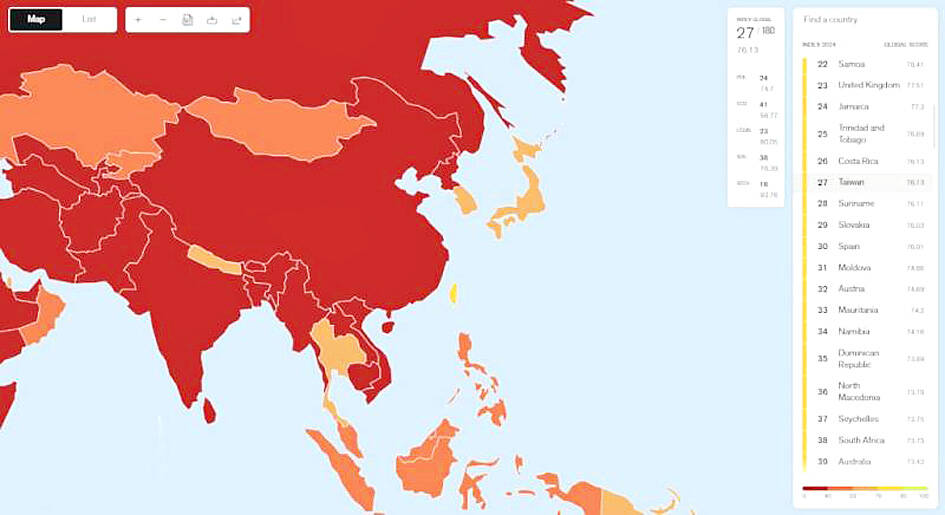Taiwan moved up eight positions to 27th in the latest World Press Freedom Index released Friday by the Reporters Without Borders (RSF), an international non-profit organization that focuses on safeguarding the right to freedom of information.
The index’s top three spots went to Norway, Denmark and Sweden, in that order, with the three Nordic countries considered to have a “good” media environment.
Taiwan’s ranking placed it fourth in the Asia-Pacific region, behind New Zealand, Samoa and East Timor, which were ranked 19th, 20th and 22nd, respectively, but ahead of Australia (39th), South Korea (62nd), Japan (70th) and Thailand (87th).

Photo grab from Reporters Without Borders (RSF) website
“Taiwan, officially the Republic of China, is a liberal democracy and the world’s 21st largest economy that generally respects the principles of media freedom,” the RSF said.
Taiwan was among the 37 countries listed in the index as having a “satisfactory” media environment.
However, according to the non-profit organization, Taiwanese journalists “still suffer from a very polarized media environment dominated by sensationalism and the pursuit of profit.”
The RSF also cited a 2022 Reuters Institute survey showing that Taiwanese people have one of the lowest levels of trust in the media among democratic countries, ranking it last in the Asia-Pacific region with a trust score of only 28 percent due to the media’s vulnerability to China’s disinformation.
Meanwhile, the Asia-Pacific region is the world’s second most difficult region to practice journalism, the RSF said, indicating that Myanmar, China, North Korea, Vietnam and Afghanistan are among the world’s 10 most dangerous countries for media personnel.
Hong Kong is ranked 135th with China 172nd among 180 countries and regions. China has the largest known number of imprisoned journalists in the world at 119, including 10 Hong Kong journalists. The RSF described China as the “world’s largest prison for journalists,” as its regime conducts a campaign of repression against journalism and the right to information worldwide.

A Vietnamese migrant worker on Thursday won the NT$12 million (US$383,590) jackpot on a scratch-off lottery ticket she bought from a lottery shop in Changhua County’s Puyan Township (埔鹽), Taiwan Lottery Co said yesterday. The lottery winner, who is in her 30s and married, said she would continue to work in Taiwan and send her winnings to her family in Vietnam to improve their life. More Taiwanese and migrant workers have flocked to the lottery shop on Sec 2 of Jhangshuei Road (彰水路) to share in the luck. The shop owner, surnamed Chen (陳), said that his shop has been open for just

Global bodies should stop excluding Taiwan for political reasons, President William Lai (賴清德) told Pope Francis in a letter, adding that he agrees war has no winners. The Vatican is one of only 12 countries to retain formal diplomatic ties with Taiwan, and Taipei has watched with concern efforts by Beijing and the Holy See to improve ties. In October, the Vatican and China extended an accord on the appointment of Catholic bishops in China for four years, pointing to a new level of trust between the two parties. Lai, writing to the pope in response to the pontiff’s message on Jan. 1’s

TAKE BREAKS: A woman developed cystitis by refusing to get up to use the bathroom while playing mahjong for fear of disturbing her winning streak, a doctor said People should stand up and move around often while traveling or playing mahjong during the Lunar New Year holiday, as prolonged sitting can lead to cystitis or hemorrhoids, doctors said. Yuan’s General Hospital urologist Lee Tsung-hsi (李宗熹) said that he treated a 63-year-old woman surnamed Chao (趙) who had been sitting motionless and holding off going to the bathroom, increasing her risk of bladder infection. Chao would drink beverages and not urinate for several hours while playing mahjong with friends and family, especially when she was on a winning streak, afraid that using the bathroom would ruin her luck, he said. She had

MUST REMAIN FREE: A Chinese takeover of Taiwan would lead to a global conflict, and if the nation blows up, the world’s factories would fall in a week, a minister said Taiwan is like Prague in 1938 facing Adolf Hitler; only if Taiwan remains free and democratic would the world be safe, Deputy Minister of Foreign Affairs Francois Wu (吳志中) said in an interview with Italian newspaper Corriere della Sera. The ministry on Saturday said Corriere della Sera is one of Italy’s oldest and most read newspapers, frequently covers European economic and political issues, and that Wu agreed to an interview with the paper’s senior political analyst Massimo Franco in Taipei on Jan. 3. The interview was published on Jan. 26 with the title “Taiwan like Prague in 1938 with Hitler,” the ministry